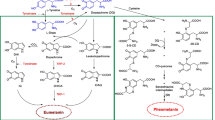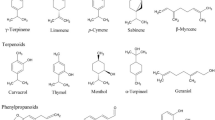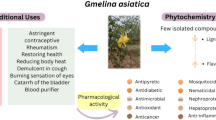Abstract
Palicourea rigida Kunth is traditionally used for the treatment of skin diseases, kidney pains and ovarian inflammation. Based on these traditional uses, this study evaluated the topical anti-inflammatory activity of the ethanol extract from P. rigida leaves (EEPR) and identified bioactive compounds. Ear edema was induced in Swiss mice by the topical application of Croton oil, arachidonic acid, phenol and capsaicin. Histopathological analysis and myeloperoxidase and N-acetyl-β-d-glucosaminidase activities were determined. EEPR was characterized by UHPLC–UV–MS HPLC and the isolated compound was identified through 1H and 13C nuclear magnetic resonance and mass fragmentation. Interaction profiles between quercetin 3-O-β-d-glucoside and cyclooxygenase-1 and -2 were established by molecular docking. EEPR significantly inhibited ear edema induced by Croton oil (p < 0.001), arachidonic acid (p < 0.01), phenol (p < 0.001) and capsaicin (p < 0.01 or p < 0.001). Histopathological analysis showed a reduction of edema, inflammatory cell infiltration and vasodilation. Additionally, the myeloperoxidase and N-acetyl-β-d-glucosaminidase activities were decreased (p < 0.001). From spectroscopic data, quercetin 3-O-β-d-glucoside was the identified compound. This compound can to interact with cyclooxygenase-1 and -2 through van der Waals interactions and dipole–dipole and hydrogen bonding’s, demonstrating inhibition of these enzymes. The results indicate that EEPR is a source of active compounds with topical anti-inflammatory activity, justifying the traditional use of P. rigida and showing that this species has a therapeutic potential to treat skin inflammatory processes.







Similar content being viewed by others
Abbreviations
- EEPR:
-
Ethanol extract from P. rigida leaves
- UHPLC:
-
Ultra-high performance liquid chromatographic
- UV:
-
Ultraviolet
- MS:
-
Mass spectrometry
- AA:
-
Arachidonic acid
- EPP:
-
Ethyl phenylpropiolate
- MPO:
-
Myeloperoxidase
- NAG:
-
N-Acetyl-β-d-glucosaminidase
- TLC:
-
Thin layer chromatography
- DEXA:
-
Dexamethasone
- INDO:
-
Indomethacin
- CON:
-
Negative control
References
Abraham SM, Lawrence T, Kleiman A, Warden P, Medghalchi M, Tuckermann J, Saklatvala J, Clark AR (2006) Antiinflammatory effects of dexamethasone are partly dependent on induction of dual specificity phosphatase 1. J Exp Med 203:1883–1889. https://doi.org/10.1084/jem.20060336
Agrawal AD (2011) Pharmacological activities of flavonoids: a review. Int J Pharm Sci Nanotechnol 4:1394–1398
Bardin L (2011) The complex role of serotonin and 5-HT receptors in chronic pain. Behav Pharmacol 22:390–404. https://doi.org/10.1097/FBP.0b013e328349aae4
Bolzani VS, Trevisan LMV, Young MCM (1992) Triterpenes of Palicourea rigida H.B.K. Rev Latinoam Quim 23:20–21
Borroni RG (2014) Pharmacogenetic markers of severe cutaneous adverse drug reactions. G Ital Dermatol Venereol 149:219–226
Brash AR (2001) Arachidonic acid as a bioactive molecule. J Clin Invest 107:1339–1345. https://doi.org/10.1172/JCI13210
Castagna M, Takai Y, Kaibuchi K, Sano K, Kikkawa U, Nishizuka Y (1982) Direct activation of calcium-activated, phospholipid-dependent protein kinase by tumor promoting phorbol esters. J Biol Chem 257:7847–7851
Cechinel Filho V, Yunes RA (1998) Estratégias para a obtenção de compostos farmacologicamente ativos a partir de plantas medicinais. Conceitos sobre modificação estrutural para otimização da atividade. Quím Nova 21:99–105. https://doi.org/10.1590/S0100-40421998000100015
Chibli LA, Rodrigues KCM, Gasparetto CM, Pinto NCC, Fabri RL, Scio E, Alves MS, Del-Vechio-Vieira G, Sousa OV (2014) Anti-inflammatory effects of Bryophyllum pinnatum (Lam.) Oken ethanol extract in acute and chronic cutaneous inflammation. J Ethnopharmacol 154:330–338. https://doi.org/10.1016/j.jep.2014.03.035
Cottiglia F, Casu L, Bonsignore L, Casu M, Floris C, Sosa S, Altinier G, Della Loggia R (2005) Topical anti-inflammatory activity of flavonoids and a new xanthone from Santolina insularis. Z Naturforsch C 60:63–66. https://doi.org/10.1515/znc-2005-1-212
Crummey A, Harper GP, Boyle EA, Mangan FR (1987) Inhibition of arachidonic acid-induced ear oedema as a model for assessing topical anti-inflammatory compounds. Agents Actions 20:69–76
Darlenski R, Kazandjieva J, Zuberbier T, Tsankov N (2014) Chronic urticaria as a systemic disease. Clin Dermatol 32:420–423. https://doi.org/10.1016/j.clindermatol.2013.11.009
Doherty NS, Beaver TH, Rheins LA, Nordlund JJ (1988) Multiple topical applications of arachidonic acid to mouse ears induce inflammatory and proliferative changes. J Invest Dermatol 91:298–302. https://doi.org/10.1111/1523-1747.ep12475630
Fischer TH, Griffin AM, Barton DW, White GC (1990) Kinetic evidence that arachidonate-induced calcium efflux from platelet microsomes involves a carrier-type ionophoric mechanism. Biochim Biophys Acta 1022:215–228. https://doi.org/10.1016/0005-2736(90)90117-7
Gábor M, Rázga Z (1992) Development and inhibition of mouse ear oedema induced with capsaicin. Agents Actions 36:83–86
Garg R, Ramchandani AG, Maru GB (2008) Curcumin decreases 12-O tetradecanoylphorbol-13-acetate induced protein kinase C translocation to modulate downstream targets in mouse skin. Carcinogenesis 29:1249–1257. https://doi.org/10.1093/carcin/bgn114
Gomes A, Das M, Sur P, Besra SE, Chakravorty AK, Das B, Ganguly DK, Vedasiromoni JR (2003) Glycosmis arborea extract as a hepatoprotective agent. Phytother Res 17:571–574. https://doi.org/10.1002/ptr.1191
Grandi TSM, Trindade JA, Pinto MJF, Ferreira LL, Catella AA (1989) Plantas medicinais de Minas Gerais, Brasil. Acta Bot Bras 3:185–224. https://doi.org/10.1590/S0102-33061989000300018
Iqbal MP, Sharif HM, Mehboobali N, Yousuf FA, Khan AH, Sellke FW (2008) N-acetyl-β-d-glucosaminidase and inflammatory response after cardiopulmonary bypass. J Coll Physicians Surg Pak 18:74–77. doi:02.2008/JCPSP.7477
Iwalewa EO, Mcgaw LJ, Naidoo V, Eloff JN (2007) Inflammation: the foundation of diseases and disorders. A review of phytomedicines of South African origin used to treat pain and inflammatory conditions. Afr J Biotechnol 6:2868–2885. https://doi.org/10.5897/AJB2007.000-2457
Kettle AJ, Winterbourn CC (1994) Assays for the chlorination activity of myeloperoxidase. Methods Enzymol 233:502–512. https://doi.org/10.1016/S0076-6879(94)33056-5
Lee SJ, Shin EJ, Son KH, Chang HW, Kang SS, Kim HP (1995) Anti-inflammatory activity of the major constituents of Lonicera japonica. Arch Pharm Res 18:133–135. https://doi.org/10.1007/BF02979147
Lee KJ, Oh YC, Cho WK, Ma JY (2015) Antioxidant and anti-inflammatory activity determination of one hundred kinds of pure chemical compounds using offline and online screening HPLC assay. Evid Based Complement Altern Med 2015:1–13. https://doi.org/10.1155/2015/165457
Lim H, Park H, Kim HP (2004) Inhibition of contact dermatitis in animal models and suppression of proinflammatory gene expression by topically applied flavonoid, wogonin. Arch Pharm Res 27:442–448. https://doi.org/10.1007/BF02980087
Lloret S, Moreno JJ (1995) Effects of an anti-inflammatory peptide (antiflammin 2) on cell influx, eicosanoid biosynthesis and oedema formation by arachidonic acid and tetradecanoyl phorbol dermal application. Biochem Pharmacol 50:347–853. https://doi.org/10.1016/0006-2952(95)00148-S
Lockette W, Brennaman B, Otsuka Y (1987) Phorbol ester, vascular relaxation, and cyclic guanosine 3′,5′-monophosphate. Hypertension 9:91–95
Lopes S, Poser GL, Kerber VA, Farias FM, Konrath EL, Moreno P, Sobral ME, Zuanazzi JAS, Henriques AT (2004) Taxonomic significance of alkaloids and iridoid glucosides in the tribe Psychotrieae (Rubiaceae). Biochem Syst Ecol 32:1187–1195. https://doi.org/10.1016/j.bse.2004.04.015
Moraes MA, Santos BCS, Fabri RL, Scio E, Alves MS, Yamamoto CH, Rodarte MP, DelVechio-Vieira G, Araújo ALSM, Araújo ALA, Sousa OV (2017) Pharmacological potential of Palicourea rigida kunth: A possible participation of flavonoid compounds. J Med Plants Res 11:194–206. https://doi.org/10.5897/JMPR2016.6320
Mukherjee S, Sur A, Maiti BR (1997) Hepatoprotective effect of Swertia chirata on rat. Indian J Exp Biol 35:384–388
Pany S, Pal A, Sahu PK (2013) In silico analysis of cyclooxygenase inhibitory activity of some natural molecules. Int J Pharm Pharm Sci 5:410–412
Penna G, Ramos A, Café ME, Penna ML, Campos MR, Martelli CMT (2006) Nosologic profile of dermatologic visits in Brazil. An Bras Dermatol 81:549–558. https://doi.org/10.1590/S0365-05962006000600006
Phanse MA, Patil MJ, Chaudhari KAPD, Patel B (2012) In-vivo and in vitro screening of medicinal plants for their anti-inflammatory activity: an overview. J Appl Pharm Sci 2:19–33. https://doi.org/10.7324/JAPS.2012.2704
Pinto MFS, Fensterseifer ICM, Migliolo L, Sousa DA, Capdville G, Arboleda-Valencia JW, Colgrave ML, Craik DJ, Magalhães BS, Dias SC, Franco OL (2012) Identification and structural characterization of novel cyclotide with activity against an insect pest of sugar cane. J Biol Chem 287:134–147. https://doi.org/10.1074/jbc.M111.294009
Pulli B, Ali M, Forghani R, Schob S, Hsieh KLC, Wojtkiewicz G, Linnoila JJ, Chen JW (2013) Measuring myeloperoxidase activity in biological samples. PLoS One 8:1–10. https://doi.org/10.1371/journal.pone.0067976
Raposo AA, Schettini APM, Sardinha JCG, Pedrosa VL (2011) Nosological profile in a dermatology referral Center in the State of Amazonas—Brazil. An Bras Dermatol 86:463–468. https://doi.org/10.1590/S0365-05962011000300007
Razavi SM, Zahri S, Zarrini G, Nazemiyeh H, Mohammadi S, Harraz FM (2009) Biological activity of quercetin-3-O-glucoside, a known plant flavonoid. Russian J Bioorg Chem 35:376–378. https://doi.org/10.1134/S1068162009030133
Redmile-Gordon MA, Armenise E, White RP, Hirsch PR, Goulding KWT (2013) A comparison of two colorimetric assays, based upon Lowry and Bradford techniques, to estimate total protein in soil extracts. Soil Biol Biochem 67:166–173. https://doi.org/10.1016/j.soilbio.2013.08.017
Rosa EA, Silva BC, Silva FM, Tanaka CMA, Peralta RM, Oliveira CMA, Kato L, Ferreira HD, Silva CC (2010) Flavonoides e atividade antioxidante em Palicourea rigida Kunth, Rubiaceae. Rev Bras Farmacogn 20:484–488. https://doi.org/10.1590/S0102-695X2010000400004
Rutgers A, Heeringa P, Tervaert JWC (2003) The role of myeloperoxidase in the pathogenesis of systemic vasculitis. Clin Exp Rheumatol 21:S55–S63
Schiantarelli P, Cadel S, Acerbi D, Pavesi L (1982) Antiinflammatory activity and bioavailability of percutaneous piroxicam. Arzneimittelforschung 32:230–235
Schmitt WH (2004) Newer insights into the aetiology and pathogenesis of myeloperoxidase associated autoimmunity. Jpn J Infect Dis 57:S7–S8
Soares PR, Oliveira PL, Oliveira CM, Kato L, Guillo LA (2012) In vitro antiproliferative effects of the índole alkaloid vallesiachotamine on human melanoma cells. Arch Pharm Res 35:565–571. https://doi.org/10.1007/s12272-012-0320-7
Szolcsányi J (2004) Forty years in capsaicin research for sensory pharmacology and physiology. Neuropeptides 38:377–384. https://doi.org/10.1016/j.npep.2004.07.005
Ulrich C, Arnold R, Frei U, Hetzer R, Neuhaus P, Stockfleth E (2014) Skin changes following organ transplantation: an interdisciplinary challenge. Dtsch Ärztebl Int 111:188–194. https://doi.org/10.3238/arztebl.2014.0188
Vencato I, Silva FM, Oliveira CMA, Kato L, Tanaka CMA, Silva CC, Sabino JR (2006) Vallesiachotamine. Acta cryst E 62:429–431. https://doi.org/10.1107/S1600536805041553
Young JM, Spires DA, Bedord CJ, Wagner B, Ballron SJ, Young LM (1984) The mouse ear inflammatory response to topical arachidonic acid. J Invest Dermatol 82:367–371. https://doi.org/10.1111/1523-1747.ep12260709
Zampeli E, Tiligada E (2009) The role of histamine H4 receptor in immune and inflammatory disorders. Br J Pharmacol 157:24–33. https://doi.org/10.1111/j.1476-5381.2009.00151.x
Zegarska B, Lelinska A, Tyrakowski T (2006) Clinical and experimental aspects of cutaneous neurogenic inflammation. Pharmacol Rep 58:13–21
Acknowledgements
This study was supported by Fundação de Amparo à Pesquisa do Estado de Minas Gerais (FAPEMIG; Grant No. CDS—APQ-01805-12), Coordenação de Aperfeiçoamento de Pessoal de Nível Superior (CAPES; Grant No. AUX-PE-PNPD-2893/2011), Conselho Nacional de Desenvolvimento Científico e Tecnológico (CNPq), and Pró-Reitoria de Pesquisa e Pós-Graduação da Universidade Federal de Juiz de Fora. We are grateful to Éder Luis Tostes and Jésus de Paula Sarmento, for the technical support.
Author information
Authors and Affiliations
Contributions
All authors had full access to all the data in the study and take responsibility for the integrity and accuracy of the data analysis. Study concept and design: OVS, ALAA, and ALSMA. Acquisition of data: RPP, MAM, BCSS, RLF, and GDVV. Analysis and interpretation of data: OVS, ALAA, GDVV, and RLF. Drafting of the manuscript: OVS, ALAA, ALSMA, and RPP. Study supervision: OVS.
Corresponding author
Ethics declarations
Conflict of interest
The authors declare no conflict of interest.
Ethical approval
All procedures performed were in accordance with international and national and were approved by Ethics Committee for Animal Research of the Federal University of Juiz de Fora (Protocols nos. 47 and 49/2012).
Rights and permissions
About this article
Cite this article
Pinheiro, R.P., Moraes, M.A., Santos, B.C.S. et al. Identification of compounds from Palicourea rigida leaves with topical anti-inflammatory potential using experimental models. Inflammopharmacol 26, 1005–1016 (2018). https://doi.org/10.1007/s10787-017-0415-3
Received:
Accepted:
Published:
Issue Date:
DOI: https://doi.org/10.1007/s10787-017-0415-3




